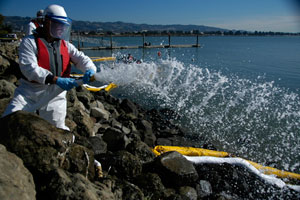In the weeks after BP’s massive oil spill in the Gulf, a number of environmental groups and scientists began raising concerns about the huge volume of chemical dispersants the company was spreading in the water. These chemicals are used to break the oil into smaller globs, which causes them to sink and supposedly biodegrade faster.
The BP disaster shed light on how little oversight there is of these chemicals, and how little is known about their long-term impacts. The Environmental Protection Agency pledged to investigate, and released its own studies in June and July that found that the dispersants were no more toxic than the oil. (By the time EPA weighed in, 1.84 million gallons of Corexit, BP’s dispersant of choice, had already been dumped in the Gulf.)
Now Peter Hodson, an aquatic toxicologist from Queen’s University in Ontario, says that the EPA’s conclusions might not be exactly true; the dispersed oil does have a more toxic effect, since toxic components like polycyclic aromatic hydrocarbons (PAHs) are spread around more widely in the water. Nature reports on his presentation at a Society of Environmental Toxicology and Chemistry in Portland, Oregon earlier this week:
The problem, explains Hodson, is that the dispersed cloud of microscopic oil droplets allows the PAHs to contaminate a volume of water 100–1,000 times greater than if the oil were confined to a floating surface slick. This hugely increases the exposure of wildlife to the dispersed oil. “EPA was presenting only part of the risk equation,” he told the meeting. “They’re trying to sugar-coat the message. In trying to understand the risks of dispersed oil, we need to understand exposure.”
Hodson’s research suggests that fish embryos, still in their eggs, are extremely sensitive to dispersed oil. “Exposures as brief as an hour can have a negative effect on embryonic fish,” he says. That, combined with the fact that for any some species, large numbers of fish can spawn at about the same time of year, means that an entire hatch could be decimated by a plume of contaminated water: “You could have a very large portion of the fish stock affected.”
Hodson also noted that, even when dispersed, the oil takes weeks to break down. Another panelist remarked that the toxic components of the oil can also last longer than the non-toxic components, further complicating the impacts. I think it’s safe to say that the full environmental impact of both the spill and the chemicals used to disperse it will take some time to fully understand.










